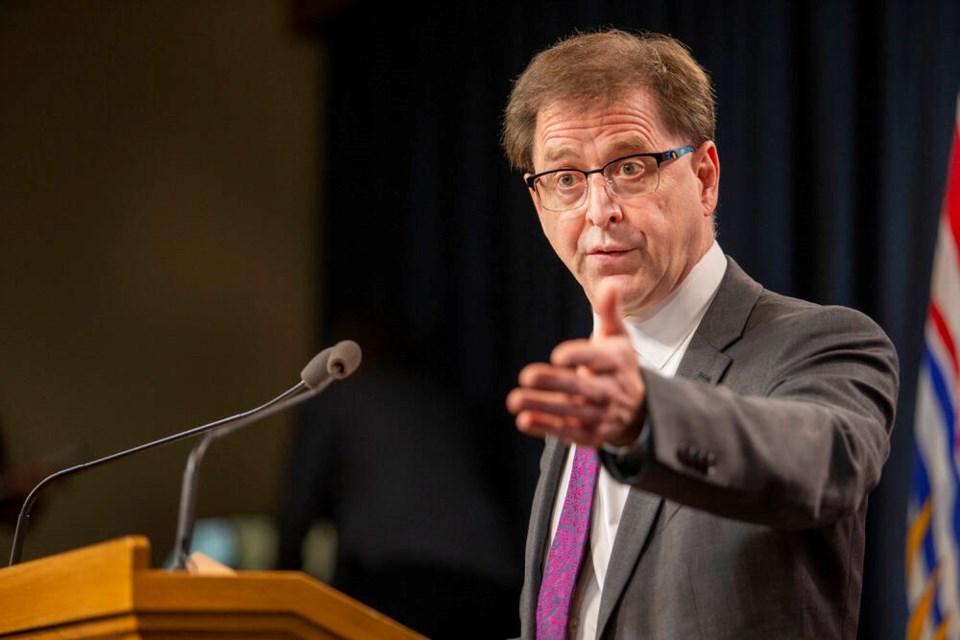B.C. has completed most of the scheduled surgeries postponed during the pandemic and is setting targets to bring down waiting lists, says the province’s health minister.
Adrian Dix said the results are nothing short of “stunning” in light of the pressures placed on health-care services by the pandemic. There are 500 to 600 people currently in hospital with COVID-19 in the province.
Health authorities have completed 78.9 per cent of booked surgeries postponed due to the fourth and fifth COVID-19 waves and extreme weather events, 96.2 per cent of those delayed due to waves two and three, and 99.8 per cent postponed in the first wave, he said.
In May 2020, Dix said about 30,000 non-urgent scheduled surgeries had been postponed because of the pandemic. Urgent surgeries — most cancer surgeries and those that must be performed within 48 hours — were not postponed, according to the health minister.
More than 52,000 urgent scheduled surgeries were completed last year, while another 72,549 unscheduled procedures were performed because the province significantly increased operating room hours, said Dix. Extra hours were scheduled on weekdays and even weekends.
However, nurses and some doctors who perform what are classified as elective surgeries, said the push to wipe out the backlog has led to worker burnout, while the delay for procedures like hip and knee replacement has stretched into years.
Aman Grewal, president of the B.C. Nurses Union, said more surgeries were being added to waiting lists even while previous backlogs were being wiped out.
There are still 88,365 people on a waitlist for surgery in the province. Of those, 81,841 are considered non-urgent surgeries.
It’s a “perpetual list” that has urgent, critical and elective surgeries added to it, which is burning out nurses who have been dealing with an onslaught of patients from COVID-19, the overdose crisis and weather events, she said.
“There’s still people waiting on the surgical wait-lists and so the impact of that, trying to catch up, is absolutely something that we understand and needs to happen. But you know, [the system] is on the brink of being in collapse,” Grewal said.
Dr. Cassandra Lane Dielwart, president of the British Columbia Orthopaedic Association, which represents about 170 surgeons, said the government can’t be patting itself on the back because bone-related surgeries are still seeing backlogs.
“We are not caught up,” she said.
“Not all surgery is created equal. Orthopedic was hit harder when it comes to surgical shutdowns because it’s viewed as an elective.”
Apart from the more known hip and knee replacement surgeries, orthopedics also involves sports and trauma procedures, Dielwart said.
There are not enough beds, nursing staff or doctors to catch up and the waiting list for most orthopedic surgeries is about two years, she said.
To get a clearer number of patients on waiting lists, Dielwart said the government should give data by department or specialty.
“Even separating the data from individual hospitals or health authorities would be helpful because if a certain hospital is working fine, well, those funds and resources might go elsewhere to places that are really struggling.”
Both Dielwart and Grewal noted burnout among staff.
Dix said 400 nurses and 100 technicians received training under the surgical renewal program to increase staffing. The province is also working to hire specialty nurses, anesthesiologists, surgeons and other staff to sustain the health-care system and ease the workloads for current staff, he said.
Grewal said nurses are working a “significant amount” of overtime along with caring for a higher number of patients than usual.
A general surgical unit would usually have one nurse for four patients, she said.
“But because of the shortages right now we are seeing one nurse to seven or eight patients, so their workload has increased a lot,” Grewal said.
Nurses are sometimes going up to 16 hours without a break because of the work overload, she added. A number of nurses have left the health-care system because of long hours and demands, she added.
“How are you going to sustain the system? You need nurses to be able to provide the care necessary to take care of these patients.”
Vancouver Island hospitals tend to be busier than those in other parts of the province, and that has held true during the pandemic. However, Island Health has had fewer COVID hospitalizations and returned to surgeries earlier than most other health authorities, resulting in the best surgical outcomes in British Columbia, according to the health minister.
Dix said the Health Ministry is now planning for what the pandemic might bring in the fall.
“COVID-19 has had an impact on health-care systems around the world, and in B.C. we are taking action to renew, rebuild, and strengthen our health-care system,” he said.
The province is working on improvements and redesigns to deliver more surgeries — those postponed and those never scheduled due to the backlog — and will set targets and timelines to recover from COVID.
“As we knew when we made our surgical renewal commitment to patients, the work to fulfil the promise is not easy,” Dix said.
“We as a government … made a promise to the people of B.C. and we’re continuing to deliver on that promise.”



